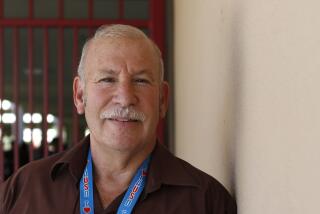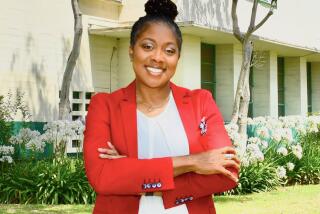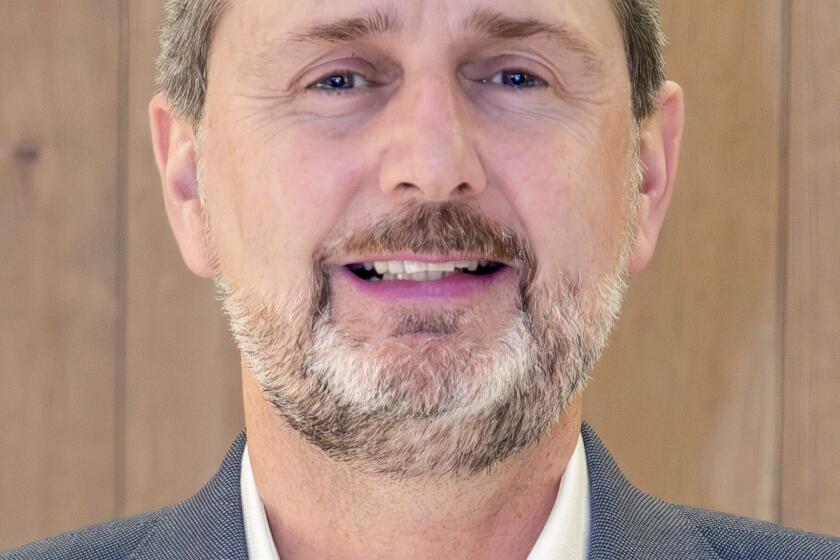New, old teachers: It doesn’t have to be ‘us vs. them’
I knew not to expect a pat on the back when I read the email’s subject line. Your stupidity it said.
It was a complaint about my Tuesday column lauding the work of a young teacher at a South Los Angeles charter school.
I’d considered that a “good news” column about education, showcasing a dedicated third-grade teacher. Many readers agreed.
“You have highlighted what’s best about education,” wrote Pam Metz, an assistant principal at West Torrance High.
But some teachers were offended. They accused me of glorifying rookies like Kaylie Gomez at the expense of experienced instructors.
“Veteran teachers don’t get the huge write ups ...” Paula Hurdle complained in her Your stupidity email. “What do veteran teachers get, the blame.”
Hurdle contends that Los Angeles Unified officials are forcing older teachers to resign or retire by fabricating “false charges” against them. “Veterans are being pushed out,” she wrote, “and rookies are in by whatever means possible.”
Another Los Angeles teacher, Elena House, bristled at the notion that young teachers are education’s new darlings. “You seem to feel that a ‘rookie’ teacher is superior to an experienced, veteran teacher simply by virtue of being a new teacher,” she wrote.
House said she is too busy “teaching, planning lessons, grading papers, calling parents … examining my students’ data to inform instruction and reteaching, differentiating instruction, etc” to court publicity. She signed her email “a proud public school teacher.”
I was surprised by the backlash. But I suppose I shouldn’t have been. I can understand why longtime teachers might be grumpy.
A generation ago, they were community heroes. Now they’re on the hot seat, with a bull’s-eye on their backs — micromanaged, overloaded and cast as impediments to reform.
::
Joan Baca can see things from both perspectives — the veterans and the newbies. She began teaching second grade in 1960 and spent 17 years as a principal in Burbank before retiring in 2001. Now she’s an education professor at Cal State Northridge, supervising students earning teaching credentials.
She understands the “negativity” expressed by experienced teachers: “It’s become ‘us versus them.’ There’s such an underlying mistrust, from the top down, in our entire society.”
Like Baca, many of those teachers entered the profession when creativity was valued and the classroom was their sanctuary. No one questioned their expertise. “We had no curriculum, no aides, no special-ed classes,” she recalled. “We supported each other. We developed our own curriculum.”
Now, instruction is scheduled and scripted. Union protections are being rolled back. Budget cuts have shifted more work to teachers. Principals are preoccupied with paperwork, and student test scores are about to become the ruler that teachers are measured by.
It’s no wonder the district’s push toward local control feels like less control to teachers. Charter schools, parent triggers and forced transfers from failing campuses suggest that energy and enthusiasm are becoming more attractive than experience.
Even technology, Baca said, makes old-school teachers “feel obsolete.”
If that’s true, then I can only imagine the teeth-gnashing this week, as the Los Angeles school board voted to spend $30 million on iPads for students.
::
Baca said I should consider the negative feedback not a knock on young teachers, but an expression of frustration and the siege mentality that breeds.
Last year, teachers faced layoffs and pay cuts until voters increased school funding. Next year, new “Common Core” standards will force wholesale changes in teaching.
Veterans’ fear of what the future holds makes hard-charging young teachers feel like a threat, Baca said. “There’s a lack of recognition, a feeling that they’re being attacked. And in some ways, unfortunately, that’s very real.”
But what’s also real is the way that current of negativity damages prospective teachers, who train alongside “master teachers” in public schools.
Baca has to buck up her charges at CSUN, who are disappointed by the way some veterans slack off in the classroom and who are discouraged by the daily diatribes on campus.
“They see a lot of burnout ... hear a lot of complaints,” Baca said. “It’s all about how terrible the students are.” Or the principal. Or the parents. “I have to tell them beware of what you hear in the lunchroom. Everything is so negative.”
That sours college students on the profession they’re about to enter.
“All that badmouthing ... I don’t like this school. I don’t like this classroom. When a new teacher enters that setting, what happens? Do they join the tribe?” Or risk becoming an outcast? “It’s a Catch-22, a terrible situation for new teachers,” Baca said.
It’s hard to collaborate with a teacher who hates her job and hard to watch that unhappiness seeping into the classroom.
That’s what makes it easy for the public to rally around young teachers and why new schools like to hire them. They have plenty of time and energy and none of the baggage that bitter experience brings.
But everyone loses when we buy into generational competition. Education benefits from the balance that collaboration brings.
Young people need a realistic view of all that teaching entails. Enthusiasm isn’t foundation enough for a career.
Veterans need to recognize the value of being open to new ideas. Complaining isn’t going to hold off change.
And we need to remember that not every longtime teacher is pining for the old days. Many love their jobs, their students, their schools. They just need to believe that we appreciate what they do.
More to Read
Start your day right
Sign up for Essential California for news, features and recommendations from the L.A. Times and beyond in your inbox six days a week.
You may occasionally receive promotional content from the Los Angeles Times.






